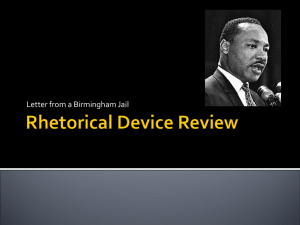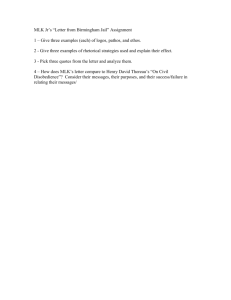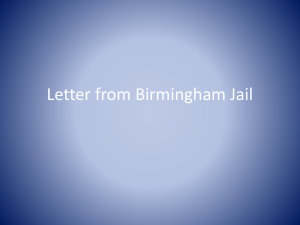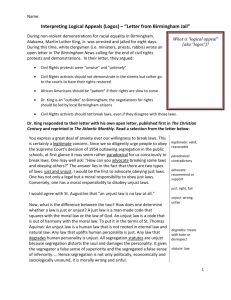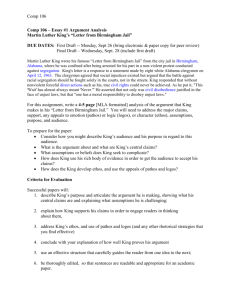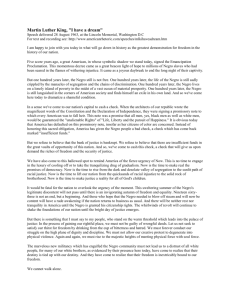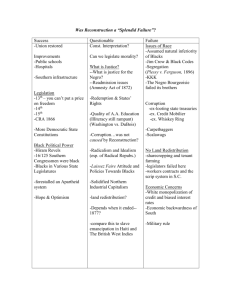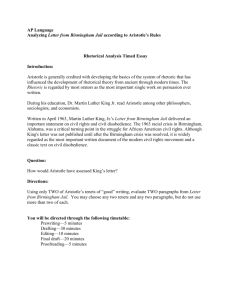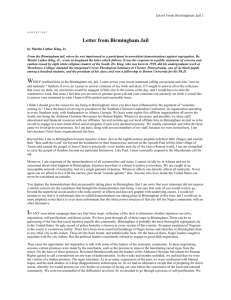MLK Letter from Birmingham Jail Rhetorical Analysis
advertisement
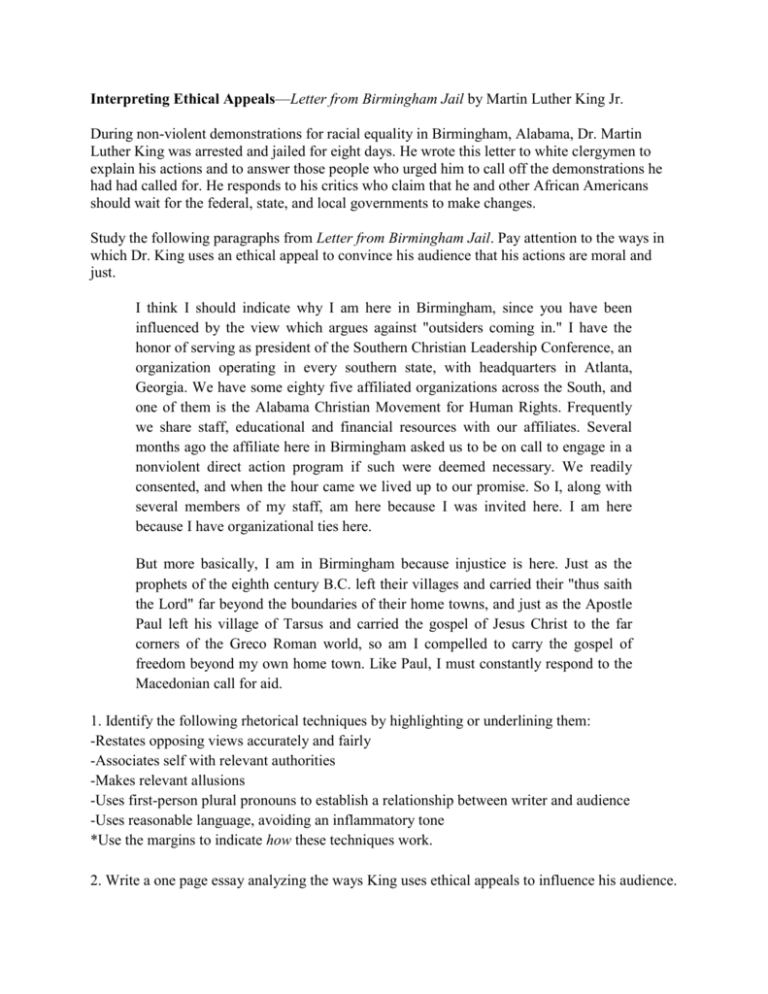
Interpreting Ethical Appeals—Letter from Birmingham Jail by Martin Luther King Jr. During non-violent demonstrations for racial equality in Birmingham, Alabama, Dr. Martin Luther King was arrested and jailed for eight days. He wrote this letter to white clergymen to explain his actions and to answer those people who urged him to call off the demonstrations he had had called for. He responds to his critics who claim that he and other African Americans should wait for the federal, state, and local governments to make changes. Study the following paragraphs from Letter from Birmingham Jail. Pay attention to the ways in which Dr. King uses an ethical appeal to convince his audience that his actions are moral and just. I think I should indicate why I am here in Birmingham, since you have been influenced by the view which argues against "outsiders coming in." I have the honor of serving as president of the Southern Christian Leadership Conference, an organization operating in every southern state, with headquarters in Atlanta, Georgia. We have some eighty five affiliated organizations across the South, and one of them is the Alabama Christian Movement for Human Rights. Frequently we share staff, educational and financial resources with our affiliates. Several months ago the affiliate here in Birmingham asked us to be on call to engage in a nonviolent direct action program if such were deemed necessary. We readily consented, and when the hour came we lived up to our promise. So I, along with several members of my staff, am here because I was invited here. I am here because I have organizational ties here. But more basically, I am in Birmingham because injustice is here. Just as the prophets of the eighth century B.C. left their villages and carried their "thus saith the Lord" far beyond the boundaries of their home towns, and just as the Apostle Paul left his village of Tarsus and carried the gospel of Jesus Christ to the far corners of the Greco Roman world, so am I compelled to carry the gospel of freedom beyond my own home town. Like Paul, I must constantly respond to the Macedonian call for aid. 1. Identify the following rhetorical techniques by highlighting or underlining them: -Restates opposing views accurately and fairly -Associates self with relevant authorities -Makes relevant allusions -Uses first-person plural pronouns to establish a relationship between writer and audience -Uses reasonable language, avoiding an inflammatory tone *Use the margins to indicate how these techniques work. 2. Write a one page essay analyzing the ways King uses ethical appeals to influence his audience. Interpreting Emotional Appeals—Letter from Birmingham Jail by Martin Luther King Jr. Study the following passage from Letter from Birmingham Jail. Pay attention to the ways in which Dr. King uses an emotional appeal to convince his audience that his actions are moral and just. We have waited for more than 340 years for our constitutional and God given rights. The nations of Asia and Africa are moving with jet-like speed toward gaining political independence, but we still creep at horse and buggy pace toward gaining a cup of coffee at a lunch counter. Perhaps it is easy for those who have never felt the stinging darts of segregation to say, "Wait." But when you have seen vicious mobs lynch your mothers and fathers at will and drown your sisters and brothers at whim; when you have seen hate filled policemen curse, kick and even kill your black brothers and sisters; when you see the vast majority of your twenty million Negro brothers smothering in an airtight cage of poverty in the midst of an affluent society; when you suddenly find your tongue twisted and your speech stammering as you seek to explain to your six year old daughter why she can't go to the public amusement park that has just been advertised on television, and see tears welling up in her eyes when she is told that Funtown is closed to colored children, and see ominous clouds of inferiority beginning to form in her little mental sky, and see her beginning to distort her personality by developing an unconscious bitterness toward white people; when you have to concoct an answer for a five year old son who is asking: "Daddy, why do white people treat colored people so mean?"; when you take a cross county drive and find it necessary to sleep night after night in the uncomfortable corners of your automobile because no motel will accept you; when you are humiliated day in and day out by nagging signs reading "white" and "colored"; when your first name becomes "nigger," your middle name becomes "boy" (however old you are) and your last name becomes "John," and your wife and mother are never given the respected title "Mrs."; when you are harried by day and haunted by night by the fact that you are a Negro, living constantly at tiptoe stance, never quite knowing what to expect next, and are plagued with inner fears and outer resentments; when you are forever fighting a degenerating sense of "nobodiness"--then you will understand why we find it difficult to wait. There comes a time when the cup of endurance runs over, and men are no longer willing to be plunged into the abyss of despair. I hope, sirs, you can understand our legitimate and unavoidable impatience. King uses several rhetorical devices to appeal to the emotions of his audience. Contrast(antithesis) 1. King employs antithesis in the second sentence. Outline the pairs of contrasts. a. Places:_____________________and___________________ b. Moves like_____________________(first place) and____________________(second place) c. Gains___________________________(first place) and _____________________(second place) 2. Explain King’s purpose in employing these antithetical places and ideas. 3. Find another example of antithesis in the excerpt. What is the rhetorical effect? Metaphor 4. The antithesis in the second sentence contains two metaphors. Identify them and explain their effect in the sentence. 5. The passage contains several other metaphors in addition to the two already mentioned. a. Identify as many metaphors as possible. b. Find a pattern in the types of metaphors Dr. King uses. c. In a well developed paragraph, connect the pattern you see to King’s rhetorical purpose. Anaphora The fourth sentence not only contains over 300 words but also develops the most powerful emotional argument in the paragraph. The force of the paragraph depends on the use of several rhetorical techniques, but the anaphora propels a driving rhythm that is particularly effective. 6. Identify similar wording repeated at the beginning of the clauses. Analyze the rhetorical effect of repeating this phrase nine times. Alliteration Dr. King is a master at using sound devices to add emphasis and detail. For instance, beginning in line 3, Dr. King writes “but we still creep at horse-and-buggy pace toward gaining a cup of coffee.” The repetition of the hard c sound accentuates the slow pace of reforms to gain even the smallest right. Both “creep” and “cup of coffee” are humble things, contrasted with Asia and Africa, which move like jets to gain something much grander than a cup of coffee—“political independence.” Dr. King uses the repetition of consonant sounds to reinforce the idea of struggling for basic rights, rights any one should take for granted. 7. Find at least three more examples of alliteration in the passage. Write the words or phrases in which alliteration is used; then write a sentence or two that explains the effect of the alliteration. a. Alliteration__________________________________________ Effect______________________________________________ b. Alliteration__________________________________________ Effect______________________________________________ c. Alliteration__________________________________________ Effect______________________________________________ d. Alliteration__________________________________________ Effect______________________________________________ Imagery This passage floods readers with imagery designed to evoke the pity, compassion, and empathy of King’s critics. 8. Identify the types of imagery listed below and write a sentence that explains the emotional effect of each one. a. Sight b. Sound C. Touch Composition 9. Write a one page essay explaining how King uses emotional appeals to influence his audience. Interpreting Logical Appeals—Letter from Birmingham Jail by Martin Luther King Jr. Study the following passage from Letter from Birmingham Jail. Pay attention to the ways in which Dr. King uses a logical appeal to convince his audience that his actions are moral and just. Logos loosely translates to “logic.” A logical appeal depends on reasoning and evidence, appealing more to the audience’s intellect than their emotions. Logical reasoning depends on the following: -deductive reasoning -reliance on authority -facts as evidence -research -tradition(precedent) -cause/effect -effective metaphors In the following passage from Dr. King’s Letter from Birmingham Jail he uses a logical appeal: You express a great deal of anxiety over our willingness to break laws. This is certainly a legitimate concern. Since we so diligently urge people to obey the Supreme Court's decision of 1954 outlawing segregation in the public schools, at first glance it may seem rather paradoxical for us consciously to break laws. One may well ask: "How can you advocate breaking some laws and obeying others?" The answer lies in the fact that there are two types of laws: just and unjust. I would be the first to advocate obeying just laws. One has not only a legal but a moral responsibility to obey just laws. Conversely, one has a moral responsibility to disobey unjust laws. I would agree with St. Augustine that "an unjust law is no law at all." Now, what is the difference between the two? How does one determine whether a law is just or unjust? A just law is a man made code that squares with the moral law or the law of God. An unjust law is a code that is out of harmony with the moral law. To put it in the terms of St. Thomas Aquinas: An unjust law is a human law that is not rooted in eternal law and natural law. Any law that uplifts human personality is just. Any law that degrades human personality is unjust. All segregation statutes are unjust because segregation distorts the soul and damages the personality. It gives the segregator a false sense of superiority and the segregated a false sense of inferiority… Hence segregation is not only politically, economically and sociologically unsound, it is morally wrong and sinful. A concession is an expression of concern for the feelings of those who may disagree with the writer’s position. Using concesion is a good way to overcome the reader’s resistance to a controversial position (for instance, breaking the law). And concession shows the writer to be both a logical thinker (one who knows and understand what the other side believes) and a concerned, fair-minded person who realizes that every argument has two sides. Using a concession takes away the opposition’s primary objection. 1. Which sentences in Dr. King’s speech make up his concession? A concession is one part of another persuasive device called a counterargument. A counterargument consists of two parts: 1. concession 2. refutation (asserting that an opponent’s arguments are wrong and arguing against them) 2. Which sentences in Dr. King’s speech make up his refutation? Dr. King uses deductive reasoning in this passage, in which a general conclusion leads to a specific conclusion. Deductive reasoning is frequently stated in a three part statement called a syllogism. Here is one example: a. (general statement) The Declaration of Independence proclaims that all people have the right to “life, liberty, and the pursuit of happiness.” b. (particular example) People of color and women are people. c. (conclusion) Therefore, one person should not enslave another, women should be allowed to vote, etc… 3. Dr. King develops a syllogism in the second paragraph. Write out the parts. You will have to change Kings’ wording a little. Here is your general statement: a. Laws that degrade the human personality are unjust. Now you add the rest of the syllogism: b. (particular example) c. (conclusion) Therefore, 4. Dr. King develops another syllogism, this one more implicit, which justifies his breaking the law. Try writing out the three parts of this syllogism. This time you are given the conclusion. a. (general statement) b. (particular example) c. (conclusion) Therefore, King and his followers have a moral obligation to break the laws of segregation. Reliance on Authority King cites two authorities highly respected by educated and moral people, St. Thomas Aquinas and St. Augustine. Research both men on the web or in a reference book. One of St. Augustine’s statements is quoted above by King. Find another statement that Augustine wrote that would support King’s position. Write on of St. Thomas Aquina’s statements that would support King’s position. 5. St. Augustine: 6. St. Thomas Aquinas: 7. Explain in a sentence or two why King would use these two men as references. Facts as Evidence King argues that two types of laws exist: just and unjust. He further states that he advocates “obeying just laws.” 8. Cite two laws which seem just two you, and explain why you think they are just. 9. Now cite two laws which you think are unjust, and explain why you think they are unjust. Letter Home Instructions You will write a letter to your parents asking for something. The “something” should be a serious request. Maybe a curfew extension, raise in allowance, a car… In your letter you will use ethos, logos, and pathos to persuade your parents to honor your request. This assignment must be typed. Your letter will be sent home, and your parents will provide me with feedback on the effectiveness of your argument. Your letter must include a counterargument(concession & refutation) and at least three of the following rhetorical devices: -Anaphora -Alliteration -Contrast (antithesis) -Metaphor -Syllogism -Allusion Place a copy your Letter Home final draft in an envelope with the questionnaire below. The questionnaire is due back to me by _____________________________. -----------------------------------------------------------------------------------------------------------------------------------------Letter Home Parent Response Your student has recently completed a unit on persuasive writing. The purpose of the enclosed letter is for your student to employ the persuasive techniques he/she has learned. After reading the letter, please take a few moments to answer the following questions. For most of the questions a simple yes or no answer will suffice, but feel free to make any other comments you would like. Make sure your student brings back the completed questionnaire by_________________________. Thank you for your time. 1. Did you understand the request being made? 2. Did your student anticipate and address an objection you might have? 3. Did your student explain why it would make sense to grant his/her request? 4. Do you feel the letter was organized and coherent? 5. Do you feel like your student put some serious thought and effort into this assignment? 6. Did your student present the argument in a manner that will make you seriously consider his/her request? 7. What is the weakest part of the letter? 8. What is the strongest part of the letter? Author: Reviewer: Letter Home Peer Review 1. Write the sentence that contains the author's request. 2. Give an example of the author's use of ethos directly from the letter. 3. Give an example of the author's use of pathos directly from the letter. 4. Give an example of the author's use of logos directly from the letter. 5. Write down the two parts of the author's counter argument--the concession and refutation. 6. If you were the parent of the author, what would your objection be? 7. What are the strong points of the letter? What does the author do well? 8. What are the weak points of the letter? Does the author's logic make sense? Is the letter organized? Does the author stay on topic? What does the author need to revise or rethink? Directions: Read the following speech made by Dr. Martin Luther King, Jr. Write a five paragraph essay(paragraphs should be at least 5 sentences) explaining how the elements of ethos, pathos, and logos have been used in this speech. You may use your notes and handouts from Letter from Birmingham Jail. Be sure to support your claims with evidence and quotes from the speech. This assignment is due at the end of the hour. DO NOT WRITE ON THIS HANDOUT. I HAVE A DREAM Dr. Martin Luther King, Jr. Delivered on 28 August 1963, at the Lincoln Memorial, Washington D.C. I am happy to join with you today in what will go down in history as the greatest demonstration for freedom in the history of our nation. Five score years ago, a great American, in whose symbolic shadow we stand today, signed the Emancipation Proclamation. This momentous decree came as a great beacon light of hope to millions of Negro slaves who had been seared in the flames of withering injustice. It came as a joyous daybreak to end the long night of their captivity. But 100 years later, the Negro still is not free. One hundred years later, the life of the Negro is still sadly crippled by the manacles of segregation and the chains of discrimination. One hundred years later, the Negro lives on a lonely island of poverty in the midst of a vast ocean of material prosperity. One hundred years later, the Negro is still languished in the corners of American society and finds himself an exile in his own land. And so we've come here today to dramatize a shameful condition. In a sense we've come to our nation's capital to cash a check. When the architects of our republic wrote the magnificent words of the Constitution and the Declaration of Independence, they were signing a promissory note to which every American was to fall heir. This note was a promise that all men - yes, black men as well as white men - would be guaranteed the unalienable rights of life, liberty, and the pursuit of happiness. It is obvious today that America has defaulted on this promissory note insofar as her citizens of color are concerned. Instead of honoring this sacred obligation, America has given the Negro people a bad check, a check that has come back marked "insufficient funds." But we refuse to believe that the bank of justice is bankrupt. We refuse to believe that there are insufficient funds in the great vaults of opportunity of this nation. And so we've come to cash this check, a check that will give us upon demand the riches of freedom and security of justice. We have also come to his hallowed spot to remind America of the fierce urgency of now. This is no time to engage in the luxury of cooling off or to take the tranquilizing drug of gradualism. Now is the time to make real the promises of democracy. Now is the time to rise from the dark and desolate valley of segregation to the sunlit path of racial justice. Now is the time to lift our nation from the quicksands of racial injustice to the solid rock of brotherhood. Now is the time to make justice a reality for all of God's children. It would be fatal for the nation to overlook the urgency of the moment. This sweltering summer of the Negro's legitimate discontent will not pass until there is an invigorating autumn of freedom and equality. Nineteen sixtythree is not an end but a beginning. Those who hoped that the Negro needed to blow off steam and will now be content will have a rude awakening if the nation returns to business as usual. There will be neither rest nor tranquility in America until the Negro is granted his citizenship rights. The whirlwinds of revolt will continue to shake the foundations of our nation until the bright day of justice emerges. But there is something that I must say to my people who stand on the warm threshold which leads into the palace of justice. In the process of gaining our rightful place we must not be guilty of wrongful deeds. Let us not seek to satisfy our thirst for freedom by drinking from the cup of bitterness and hatred. We must forever conduct our struggle on the high plane of dignity and discipline. We must not allow our creative protest to degenerate into physical violence. Again and again we must rise to the majestic heights of meeting physical force with soul force. The marvelous new militancy which has engulfed the Negro community must not lead us to a distrust of all white people, for many of our white brothers, as evidenced by their presence here today, have come to realize that their destiny is tied up with our destiny. And they have come to realize that their freedom is inextricably bound to our freedom. We cannot walk alone. And as we walk, we must make the pledge that we shall always march ahead. We cannot turn back. There are those who are asking the devotees of civil rights, "When will you be satisfied?" We can never be satisfied as long as the Negro is the victim of the unspeakable horrors of police brutality. We can never be satisfied as long as our bodies, heavy with the fatigue of travel, cannot gain lodging in the motels of the highways and the hotels of the cities. We cannot be satisfied as long as the Negro's basic mobility is from a smaller ghetto to a larger one. We can never be satisfied as long as our children are stripped of their selfhood and robbed of their dignity by signs stating "for whites only." We cannot be satisfied as long as a Negro in Mississippi cannot vote and a Negro in New York believes he has nothing for which to vote. No, no we are not satisfied and we will not be satisfied until justice rolls down like waters and righteousness like a mighty stream. I am not unmindful that some of you have come here out of great trials and tribulations. Some of you have come fresh from narrow jail cells. Some of you have come from areas where your quest for freedom left you battered by storms of persecution and staggered by the winds of police brutality. You have been the veterans of creative suffering. Continue to work with the faith that unearned suffering is redemptive. Go back to Mississippi, go back to Alabama, go back to South Carolina, go back to Georgia, go back to Louisiana, go back to the slums and ghettos of our northern cities, knowing that somehow this situation can and will be changed. Let us not wallow in the valley of despair. I say to you today my friends - so even though we face the difficulties of today and tomorrow, I still have a dream. It is a dream deeply rooted in the American dream. I have a dream that one day this nation will rise up and live out the true meaning of its creed: "We hold these truths to be self-evident, that all men are created equal." I have a dream that one day on the red hills of Georgia the sons of former slaves and the sons of former slave owners will be able to sit down together at the table of brotherhood. I have a dream that one day even the state of Mississippi, a state sweltering with the heat of injustice, sweltering with the heat of oppression, will be transformed into an oasis of freedom and justice. I have a dream that my four little children will one day live in a nation where they will not be judged by the color of their skin but by the content of their character. I have a dream today. I have a dream that one day down in Alabama, with its vicious racists, with its governor having his lips dripping with the words of interposition and nullification - one day right there in Alabama little black boys and black girls will be able to join hands with little white boys and white girls as sisters and brothers. I have a dream today. I have a dream that one day every valley shall be exalted, and every hill and mountain shall be made low, the rough places will be made plain, and the crooked places will be made straight, and the glory of the Lord shall be revealed and all flesh shall see it together. This is our hope. This is the faith that I go back to the South with. With this faith we will be able to hew out of the mountain of despair a stone of hope. With this faith we will be able to transform the jangling discords of our nation into a beautiful symphony of brotherhood. With this faith we will be able to work together, to pray together, to struggle together, to go to jail together, to stand up for freedom together, knowing that we will be free one day. This will be the day, this will be the day when all of God's children will be able to sing with new meaning "My country 'tis of thee, sweet land of liberty, of thee I sing. Land where my father's died, land of the Pilgrim's pride, from every mountainside, let freedom ring!" And if America is to be a great nation, this must become true. And so let freedom ring from the prodigious hilltops of New Hampshire. Let freedom ring from the mighty mountains of New York. Let freedom ring from the heightening Alleghenies of Pennsylvania. Let freedom ring from the snow-capped Rockies of Colorado. Let freedom ring from the curvaceous slopes of California. But not only that; let freedom ring from Stone Mountain of Georgia. Let freedom ring from Lookout Mountain of Tennessee. Let freedom ring from every hill and molehill of Mississippi - from every mountainside. Let freedom ring. And when this happens, and when we allow freedom ring when we let it ring from every village and every hamlet, from every state and every city, we will be able to speed up that day when all of God's children - black men and white men, Jews and Gentiles, Protestants and Catholics - will be able to join hands and sing in the words of the old Negro spiritual: "Free at last! Free at last! Thank God Almighty, we are free at last!"
